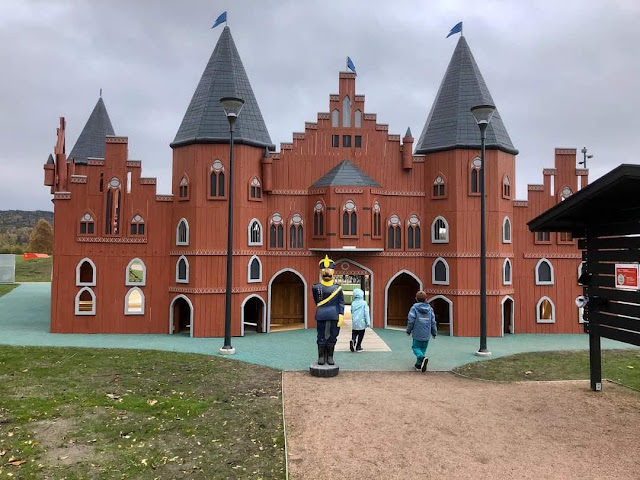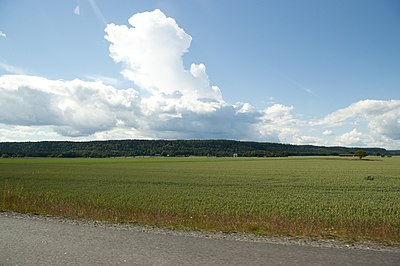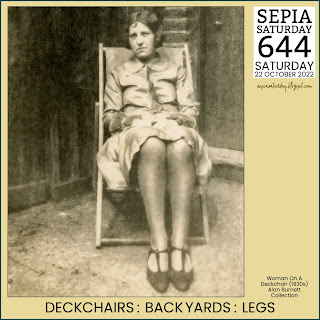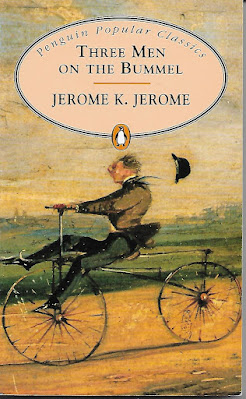 |
On horseback - Kviberg 1925
|
The Göta Artillery Regiment (Swedish: Göta artilleriregemente), designation A 2, was a Swedish Army artillery regiment that traced its origins back to the 17th century. From 1895, and until it was disbandoned in 1962, it was garrisoned at Kviberg in Gothenburg (Göteborg). And that's where my grandfather Gustaf did his compulsory military service in 1925, at age 21.
 |
| Gustaf in uniform, 1925 |
 |
| Kviberg 2006 - Photo from Wikimedia Commons |
In the area today, you'll find housing, municipal offices, businesses and various association premises. Recently, a theme playground was added, inspired by the history of the place. A friend of mine visited it and posted some photos on Facebook. I asked her permission to show those here as well:
 |
| Kviberg, playground 2022 - Photo: G.C. |
 |
| Kviberg, playground 2022 - Photo: G.C. |
 |
| Kviberg, playground 2022 - Photos: G.C. |
For my grandfather Gustaf in 1925, Kviberg seems to have been rather the opposite of an "amusement park", though. While I do not have any letters written by himself from his time there, I do have some written to him by Sally (my grandmother) and her brother Nils, which also reflect a bit of what Gustaf in turn wrote back to them.
In earlier posts I have shared my deduction that Nils and Gustaf were friends since childhood, having grown up in the same village. In 1925, Gustaf and Sally were also still just "friends". (She was four years older, and if deeper feelings had begun to develop, at least they were not yet pronounced).
The first letter (following below) is from Nils, with a short PS from Sally added at the end; and obviously written not long after Gustaf had gone off to Kviberg. Nils, two years older than Gustaf, had his own military service behind him (1923, and I think in Borås). (Correction will be added in the next post.)
 |
| Nils to the far right in the middle row. |
 |
| Nils in a somewhat more elegant uniform |
Military terminology is not my area of expertise (in any language!); but I hope my translation will convey the general idea, and the 'tone of voice'. (Further comments about the content, and people mentioned, will follow below the letter itself.)
Fristad, 22.3.1925
Dear Conscript 24331 Johansson [---]
Thanks for your letter. So, you're already angry with the commanding officers. Way to go! Completely natural, and very expedient - especially if shown openly. Should make things sooo easy when you need to ask for leave of absence...
I gather from your letter that you appreciated the enlistment ceremonies. Getting a tunic that fit seems to have been particularly difficult. You know, when I read that, a poem by [our friend] Klas came to mind --- [quote referring to conscripts being given ill-fitting clothes]
Yesterday evening I went to the annual meeting of the Farmers' Association, to write a report [for the newspaper]. Then I went to visit Karl Nilsson and he gave me a cigarillo, which I smoked. He accompanied me to the church, and asked me if I had heard from you. I said ”yes” - and then some more. After that I met Arvidsson. He asked the same question, and got the same answer.
No need to worry about T. [Gustaf's grandfather]. I was up there today, but he wasn't home. But I looked through the window, and saw that he'd made the bed, and everything seemed to be in order. When I see him, I'll pass on your greetings.
So you didn't get to be a signalist. I kind of suspected you wouldn't. Being a coachman should be better than serving the cannons, though – I think.
Not much to report from here. Life goes on as usual. Mum and Hildur have gone to church. Kalle keeps nodding off, and Sally is snapping her fingers. A typical peaceful Sunday. In a few minutes I'll be off to the annual meeting of the cooperative association. Looking forward to the walk, as we're having beautiful spring weather. Tonight I'll be seeing Nilsson at the 7 o'clock train, to give him the report from the meeting. And on Wednesday we'll probably be going to visit Klas together.
Sally wants to add a few lines, so I'll say bye for now.
Your friend, Nils
[PS written by Sally]
Greetings to you from ”Mor Bengta”. Thanks for the greetings I was about to get in your letter to Nils. Actually, we thought it got so empty here after you left that we almost felt like shedding a few tears – well, by ”we”, I mean we three women... Welcome home for Easter! "Bengtamora"
Comments:
"Dear Conscript 24331 Johansson" - The original letter starts with a long line of abbreviations that Nils calls a "puzzle", and asks Gustaf to work out the meaning himself. (If he can't, Nils will explain it in his next letter - which unfortunately, I don't have!) But the first few obviously refer to Gustaf's conscription number and surname. At the time, he was still using his father's surname, Johansson. (He changed to his mother's surname later.)
Klas - Must refer to a local poet and historian, Klas Olofson, who was well known in the village where they lived. I don't think he ever reached national fame, but he was a great inspiration to Gustaf when it came to collecting stories and folklore from their own neighbourhood. Nils quotes only a few words from the poem by Klas that he's thinking of - something about the military jacket not made to fit a dromedary. Since I've never seen/heard the full poem, I confess I'm having trouble fitting the dromedary into a Swedish army context. But it obviously refers to the fact that conscripts have to make do with the clothes they're given, and can't be fussy.
 |
| The uniform jacket referred to?? |
Karl Nilsson - Another friend and mentor to my grandfather, working at the small newspaper in town, where Gustaf started out as a journalist. From this letter it seems that Nils also contributed freelance reports to the paper sometimes. Or maybe he was just helping out with that while Gustaf was away. (From what I know, after Nils got married and moved away from the farm, he worked as a bus driver and taxi driver. His oldest son became a journalist though.)
T. - Gustaf's grandfather, 70 years old in 1925, and a widower since 1922, was now living alone in the small 'croft' cottage on the grounds of a neighbouring farm. I have got the impression that he was also a periodic alcoholic. Whatever the main reason, Gustaf was obviously worried about him, and had asked his friends to keep an eye on him.
Kalle (Carl) was Sally's and Nils' oldest half-brother (by their father); running the farm where they lived, and 55 years old in 1925. (As far as I know he never married. He died in 1928.) Hildur was Sally's and Nils' older half-sister by their mother. - 33 years old and still single in 1925.
"Sally is snapping her fingers" - I don't know if this was a habit of hers; or if she was just impatient to take over the pen from Nils and add her PS to the letter!
"Mor Bengta" or "Bengtamora" =”Mother Bengta”. This seems to have been a private joke between Gustaf and Sally – a nickname he had given her, perhaps? The name Bengta doesn't ring a bell with me, so I don't know what or who it might refer to (a real person, or a fictional character). Sally does not seem to mind the nickname though, because she keeps signing herself so in a few more letters to come. (Perhaps she was acting "motherly" towards Gustaf sometimes?)
- - -
(going with "groups" and "damaged photos")
SVENSKA
Brev från Nils (med PS av Sally); till Gustaf (på Kviberg)
Fristad d. 22/3 1925
K. dr. vpl. 24331 J-n o. k. G. a. A2 K. G. ä. f. på 3. b. o. i. e. s-n. f. s.
Detta är en rebus. Kan du lösa den, så sänd mig lösningen i nästa brev! Varom icke, skall du sedan få reda på, vad den betyder.
Tack för brevet. Jaså, du har redan blivit lömsk på befälet. Rätt så, rätt så. Det är fullkomligt naturligt, och synnerligen ändamålsenligt att tillämpa i praktiken. Åtminstone visa det öppet. Det går så lätt att få permission se'n så –
Av ditt brev ser jag, att du tyckte stunden, då du fick ”lump”, var synnerligen högtidlig. Särskilt svårt var det visst att få en passande kollett. *
*livrock utan skört l. med korta sådana; sedan länge bl. mil.; numera bl. om dylikt plagg (med korta skört o. ståndkrage) tillhörande den dagliga dräkten vid artilleriet o. fortifikationen samt (för officerare o. underofficerare) vid vissa kavalleriregementen [SAOB]
Vet du,när jag läste det kom jag att tänka på Klas' ”Beväringens exercis”: ” --- Kronans helga jacka syddes --- ingalunda åt en dromedar” etc.
Igår kväll var jag och refererade Bondeförbundets årsmöte. Sedan var jag hos Karl Nilsson och fick en cigarr-cigarett. Jag rökade den. Nilsson följde mig till kyrkan och frågade om jag hört något från dig. ”Ja”, sa' ja'. Och sedan lite mer. Sedan träffade jag Arvidsson. Han frågade detsamma och fick samma svar.
Tulin skall du icke oroa dig för. Jag var däruppe i dag på fm, men träffade honom ej hemma. Såg genom fönstret, att sängen var uppbäddad och allt i ordning. När jag träffar honom skall han få hälsningar från dig.
Du blev ej signalist. Jag nästan anade det. Men kusk är i alla fall bättre än vara med bland kanonservisen. Tror jag.
Härifrån är icke mycket att berätta. Allt går sin gilla gång, och mamma och Hildur hava gått till kyrkan. Kalle sover mellan han är vaken och Sally knäpper med fingrarna. Allt är söndagsfrid. Om några minuter skall jag gå till koop. fören. årsmöte. Det skall bli härligt med en promenad, alldenstund vädret [är] vårgrannt.
Ikväll skall jag träffa Nilsson vid 7-tåget. Han skall ha referatet från koop. mötet. På onsdag skall vi visst gå till Klas. Om det blir av.
Sally vill skriva några rader, därför ”Hej!” till nästa gång.
Vännen Nils
PS (skrivet av Sally)
Hälsningar till dig från ”Mor Bengta”. Tack skall du ha för hälsningarna jag höll på att få i Nils' brev. Vet du, det blev så tomt efter dig här sedan du rest, tyckte vi, så det var nära vi togo till ”lipen” lite var – ja, jag menar vi tre fruntimmer.
Välkommen hem till Påsk! D.S. ”Bengtamora”
Kommentarer:
Göta artilleriregemente (A 2) flyttade in på
Kviberg 1895; och där gjorde min farfar Gustaf sin värnplikt år 1925 (21 år gammal).
På platsen idag finns "kommunal förvaltning, bostäder, småföretag, föreningslokaler och annan verksamhet". 2022 invigdes också en tema-lekplats, vars utformning inspirerats av platsen historia. En vän till mig besökte denna nyligen, och har gett mig tillåtelse att använda hennes foton här.
För min farfar, 1925, tedde sig Kviberg dock knappast som någon ”nöjespark”, vilket framgår av brevet ovan, skrivet av hans vän Nils (bror till min farmor Sally, som också skrivit ett PS på slutet). (Sally och Gustaf var vid den här tidpunkten än så länge bara vänner.)
Nils var två år äldre än Gustaf och hade sin värnplikt avklarad (1923).
”Detta är en rebus” osv. Tyvärr har jag inte vare sig Gustafs svarsbrev eller Nils' nästa skrivelse, och det enda jag känner mig säker på är att ”vpl. 24331 J-n” måste stå för ”värnpliktige 24331 Johansson”, samt att A2 var artilleriregimentet på Kviberg. Gustaf använde vid den här tiden fortfarande sin fars efternamn, Johansson. Han bytte senare till moderns och morföräldrarnas efternamn, Thulin.
Klas – Klas Olofsson, en lokalt välkänd poet och historiker, författare till samlingsverket ”Folkliv och folkminne” (1928 + 1931). Jag tror inte han nådde nationell berömmelse men han var en stor inspirationskälla för min farfar Gustaf när det gällde att samla historier och sägner från trakten där de bodde. Klas' dikter har jag inte, och har aldrig läst.
Karl Nilsson – Också en vän och mentor till Gustaf. Han arbetade på tidningen Borås Nyheter, där Gustaf också började sin bana som journalist.
Av detta brev framgår att även Nils ibland tydligen skrev notiser för tidningen (t.ex. från lokala årsmöten). Men kanske var detta bara tillfälligt, som ersättare för Gustaf? Vad jag vet, så arbetade Nils (efter sitt giftermål) som busschaufför och taxiförare. Hans äldste son blev dock journalist till yrket.
Tulin (Thulin) var Gustafs morfar. 1925 var han 70 år, änkling sedan tre år, och bodde nu tydligen ensam i torpet (som löd under en granngård till Storegården). Jag har av andra anteckningar fått intrycket att han var periodisk alkoholist. Vad än huvudorsaken var, så oroade sig Gustaf tydligen för hur han klarade sig, och hade bett sina vänner på Storegården att hålla ett öga på honom.
Kalle (Carl) var Sallys och Nils äldre halvbror (från fadern Samuels första äktenskap). Han tog över skötseln av gården redan några år innan faderns död 1907. Så vitt jag vet gifte han sig aldrig. Han dog 1928. Hildur var Sallys och Nils äldre halvsyster från deras mors sida. 1925 var hon 33 år och fortfarande ogift hemmadotter. (Sally, Nils och Hildur gifte sig alla samma år - 1930.)
”Sally knäpper med fingrarna” - Jag vet inte om detta var en vana hon hade, eller om hon bara just då var otålig att få ta över pennan, och lägga till sitt PS till brevet!
"Mor Bengta" / "Bengtamora" – Detta verkar vara ett privat skämt mellan Gustaf och Sally – ett smeknamn han gett henne, kanske? Namnet Bengta säger mig ingenting, så jag vet inte vad eller vem det syftar på. Sally tycks dock inte ha något emot det, för hon fortsätter att använda det även i kommande brev till Gustaf under 1925. Kanske uppträdde hon ”moderligt” mot honom ibland? (Hon var fyra år äldre, och när de var yngre måste åldersskillanden ha känts större.)

























